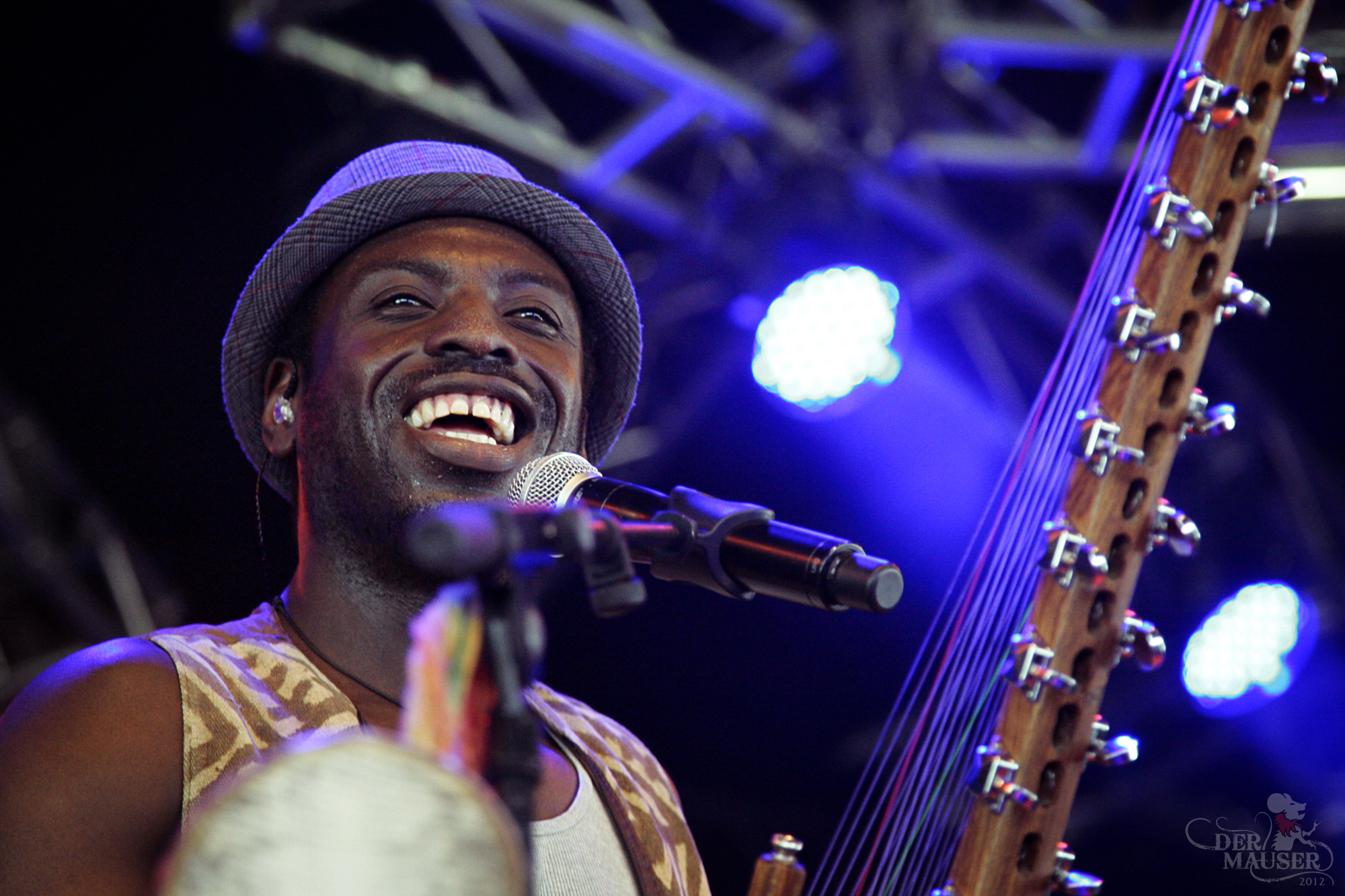Dawda Jobarteh’s kora music is recognised by his diversity of collaborations. But it was not before moving to Denmark, that he taught himself how to play the kora. On the new album Soaring Wild Lands, the kora meets classical string instruments. Mix Musik meets Dawda in a talk about musical curiosity.
text: Karolina Jeppson
The song Sunset in Batumi, was the first single from the new record Soaring Wild Lands. Ever since I heard it the first time, I wanted to keep it in my ears forever. It brings peace to the mind and has a calming effect on the daily duties. On the very day of the album release, I meet Dawda Jobarteh in a café, in the part of Copenhagen called Frederiksberg. We are sitting by the window facing a busy Friday afternoon street, celebrating his new record at Sterns Music (UK). I wonder how the collaboration on the album with Admeta String Quartet, came about.
– “I have had the idea of combining kora with a string orchestra for a long time. These are all ancient classical instruments. In my imagination they would make a beautiful match. In 2019, I went to Batumi in Georgia to be part of a global music camp for music students from around the world. I came as a support teacher, but ended up teaching my own class. There, among a lot of string instrumentalists, I got very inspired and could see the potential of having these elements in my music.”
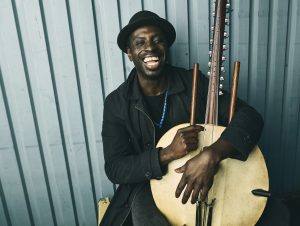
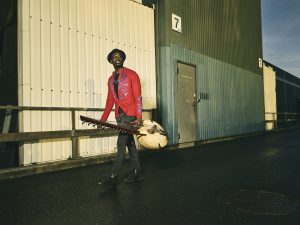
Kora improvisation meets classical music notes
In Batumi, Dawda met Danish music professor and saxophonist Jens Christian “Chappe” Jensen from the Royal Academy of music in Aarhus. After Batumi, the two of them started a collaboration. “Chappe” is playing on one tune on the record, but also acted as the link to classical music. When Chappe got Admeta String Quartet, who are students at the Academy, on board, the musical meeting became real.
– “I got so many ideas for new songs after Batumi, but I don’t write and read music as classical musicians do. Instead, I create by singing and playing, and I record different layers and ideas. I presented this to Chappe, and then we would rearrange them for strings and Chappe wrote the scores for Admeta String Quartet. It was a wonderful process. While working, I was sometimes in another universe.”
Dawda laughs. He explains that he mostly works at night at home, in his studio, while his family is sleeping.
– “At this time in the night there is some magic in the air…”
He looks dreamy and continues:
– “Musicians like me are used to simply listen to each other and follow when playing together and for some of the classical musicians that can be a challenge. While we recorded the strings, I sometimes urged the string players to improvise. At some point I said: ‘No papers! Follow my hands. Music is inside of us!”
Dawda demonstrates with his hands while adding:
– “But no way is better than the other, both are great tools and we took the opportunity to learn from each other’s ways of approaching music.”
Pandemic time became productive
At the same time as the collaboration started in 2020, the pandemic wiped out all the concerts in Dawda’s calendar, as well as for most musicians.
– “When it comes to performing, the pandemic was of course not good. But I could now spend my time on composing and working with Chappe and Admeta String Quartet. I had enough time to compose and record another album that will come out later this year. It features Norwegian trumpet player Gunnar Halle.”
Dawda Jobarteh plays with the New Jungle Orchestra once in a while, and regularly with some of the same musicians including Gunnar Halle in the quartet SCRAM.
– “The pandemic gave me peace and time for all of this. It made me realize the beauty of what I have. It was unfortunate for many people, but we could not do anything to change it. So I made the best out of it.”
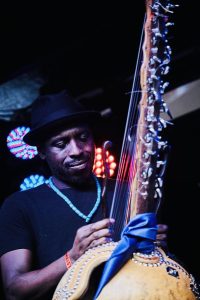
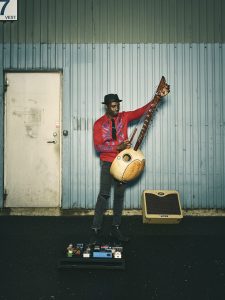
The contacts with Sterns Music
Soaring Wild Lands is Dawda’s fourth album on Sterns Music, a record label in the United Kingdom with deep connections to music in Africa. Sterns Music was the first British record label to release recordings of stars like Franco & OK Jazz and Salif Keita.
– “Sterns Music worked with my two uncles nearly 40 years ago. I got to know them when Womex was held in Copenhagen for the first time. We made an Off-Womex showcase at Copenhagen Jazzhouse, and Sterns were invited. They told me to send my music whenever I had something. At the time I had not started recording my own music yet.”
When Dawda had made his first recordings, he sent them to Sterns Music. They showed immediate interest in the music, and the first record was released; Northern light, Gambian night in 2011. All four records that are released on Sterns Music, are Dawda’s own compositions for kora, except for some traditional songs or some jazz tunes.
Heritage from Gambia’s most famous griot families
Growing up in Brikama, a city in the part of Gambia that borders Casamance, Dawda Jobarteh comes from two griot families with a distinguished history. He is the son of Amadou Bansang Jobarteh, the favoured musician by Gambia’s first president. Dawda’s maternal grandfather was the composer Alhaji Bai Konte, who’s tunes are still used in classical kora repertoires. Dawda is the uncle of Toumani Diabaté and Sona Jobarteh. His mother’s brothers are also famous griots.
– “I was born in my maternal uncle’s compound where I lived until I moved to Denmark at the age of 22. When I was around 6 years old, my mother remarried and moved away. Normally in the griot families, most of the men play the kora. But I chose the drums. I didn’t feel comfortable with the kora at the time. I played percussions in my cousins’ bands, and we went touring in the Gambia, Senegal, England, France, Germany and in the US.”
So, although being raised by kora masters, Dawda chose to start playing the traditional instrument later on in life, in another musical context, and with no one to teach him. From an early age, Dawda showed an interest in different musical styles.
– “I was of course influenced by the music we had at home, but also by music from Senegal and Mali. My mother always listened to music from Mali and Guinea. I started to notice the differences. In the Gambia I met a Danish musician who played the saxophone, and it was the first time I heard this instrument live.”
Started to learn the kora in Denmark
After meeting international artists in the Gambia, Dawda was invited to teach percussions at a folkehøjskole in the small town Vrå in Northern Denmark in 1998.
– “One of the teachers had a kora. I had a lot of spare time so, I started to play the kora because I was bored. I did not know how to tune it, and we tuned it by a piano. The sound became very different from what I have heard before at home.”
– “When I moved to Denmark permanently the following year, I was asked to play the kora at concerts. I was thrown into deep water so I had to learn how to swim…. I worked very hard, and I was encouraged by the opportunities I got.”
Learning the kora in Denmark also meant that his influences were different than in the Gambia.
– “I think that learning the kora around here boosted my musical curiosity. It made me interested in reaching out to other musician and experiment together. On all my albums, I have invited guest musicians. On the very first album Northern Light, Gambian Night I have one song with Toumani Diabaté, another one with a fantastic Indian flute player, Shashank Subranayam, and also with the Camerounian bass player Etienne Mbappé as well as Linley Marthe from Martinique.”
Collaborative projects hand in hand with composing
Dawda’s various collaborations with other musicians is reflected in the list of concerts for the first months of 2022 where he has played and will play with Admeta Strings, Fatoumata Diawara and DR Bigband, Dawda Jobarteh/Stefan Pasborg Duo, CTM and SCRAM.
– “I engage in various constellations and sometimes it is difficult to find time for my own projects and to compose my own things. I try to create my own space too. But I like to have it that two-fold way. It is a way of getting inspired, to see the beauty in different people I collaborate with and music I engage in.”
Do you have more musical dreams?
– “My next dream is to do a project with a vocalist. I don’t think I will ever stop being curious about new stuff, new music, new collaborations.”

